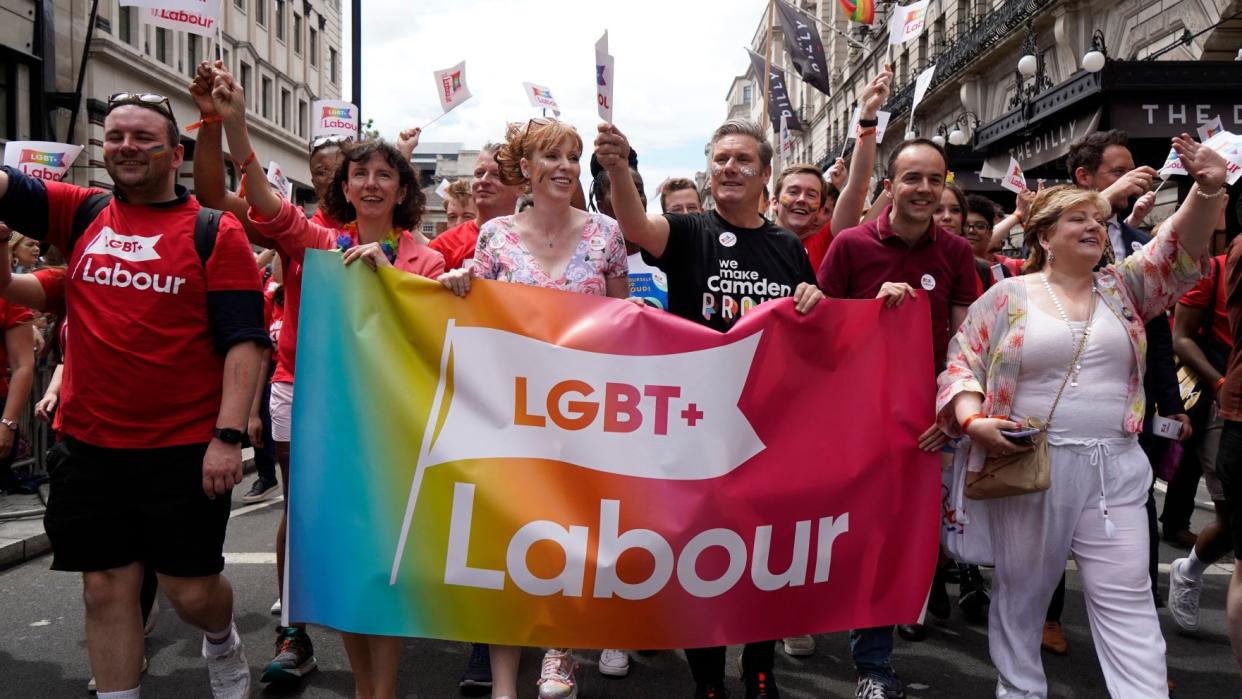Where does Labour stand on trans rights?

Labour has reaffirmed its commitment to "modernise, simplify and reform" the process of legally changing gender.
The party has said its plans will "remove indignities for trans people who deserve recognition and acceptance" but also provide "protections so you can't legally change your gender overnight".
In response, Tory leadership hopeful Kemi Badenoch, the women and equalities minister, said this would "unravel all the protections in the current system designed to protect women and girls" and create "loopholes for predators and bad-faith actors to infiltrate women-only spaces and put us at risk".
What is Labour's position?
Under existing laws, transgender people wishing to have their new gender legally recognised must obtain a gender recognition certificate (GRC).
Labour plans to remove what it terms outdated elements of this process, including consent from a spouse if the person is married and the requirement to prove the applicant has lived as their preferred gender for two years. This will be replaced with a two-year "reflection" period after the application has been submitted. A panel of doctors and lawyers that currently approves GRCs will also be replaced by a single doctor specialising in gender issues, who will be able to provide a medical report supporting the gender change.
Plans to introduce a controversial self-ID law, which would remove the need for a medical diagnosis altogether, have been abandoned.
Has Labour's stance changed?
The proposals set out this week are "largely the same" as those outlined last year by Labour's national policy forum, said The Guardian. Nonetheless, said The Times, they are "likely to heighten concern among critics over Labour's approach to transgender issues".
Keir Starmer appeared to change his position on transgender rights during Thursday's BBC "Question Time" election special. Last year, the Labour leader said "99.9% of women" do not have a penis and in 2021 stated it was "not right" for Labour MP Rosie Duffield to say that "only women have a cervix". But on Thursday night he said he agreed with former Labour leader Tony Blair's position that "biologically, a woman is with a vagina and a man is with a penis".
In April, shadow cabinet member Louise Haigh suggested Labour should be a "safe space" for gender-critical but not transphobic opinions, amid fresh party tensions over gender in the wake of the Cass review.
Speaking on Times Radio this morning, the shadow health secretary Wes Streeting said: "I think at times in pursuit of inclusion, we've ended up in a position where women have felt excluded, biological women have felt excluded." He added that he was "very optimistic" that Labour could find a way to address both the rights of biological women and trans women in the debate.
How do Labour compare to the Conservatives?
As part of its manifesto, the Conservatives have promised to rewrite the Equality Act so that it only offers protections on the basis of a person's biological sex.
At present, sex, along with race, disability and sexual orientation, is a protected characteristic and the act makes it illegal to discriminate against someone on those grounds. The Conservatives do not want the term "sex" to apply to those who have changed their legal sex, said Context, in order to "protect female-only spaces and competitiveness in sport".
In contrast, Labour has said it supports the Equality Act as it is, "including its exemptions that allow for the provision of single-sex spaces in certain circumstances", said the news site.
The two parties also differ on how children are taught about sex and gender in schools.
Shadow education secretary Bridget Phillipson has suggested she would scrap planned Tory guidelines on "gender ideology" in schools. The guidance, which was set to come into effect in the coming months, says pupils should not be taught
"that people can be born the wrong sex and that they can change their identity to the opposite sex or other categories such as 'non-binary'", said The Telegraph.
Responding to accusations that the wording had "drifted far too much into partisan and unnecessary language", Education Secretary Gillian Keegan warned a Labour government "would play politics with the lives of our children by ripping up guidance on gender-questioning children".


